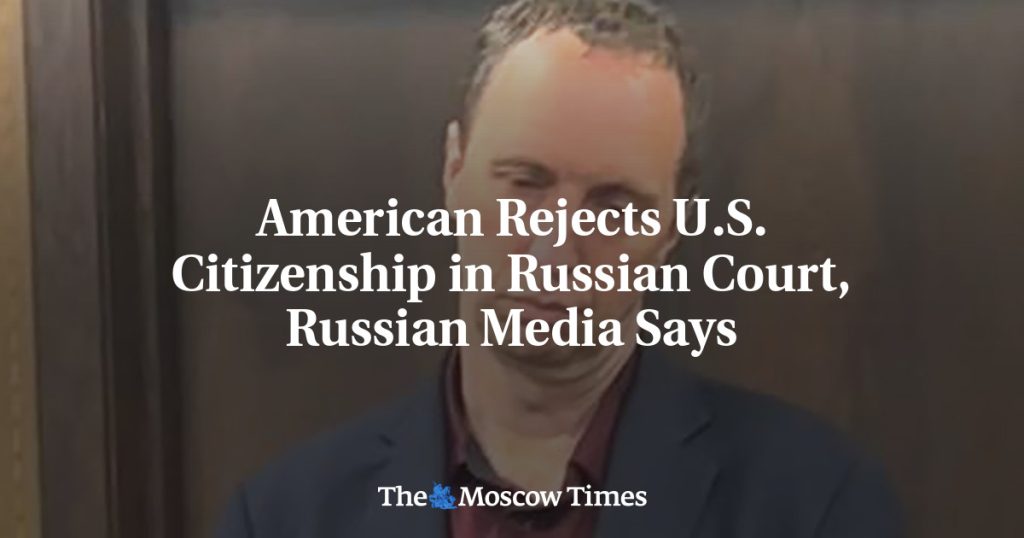An American citizen, Joseph Tater, rejected his U.S. citizenship in a Moscow court, claiming that he was the victim of political persecution in the United States. Tater was in court after being accused of assaulting a police officer in Moscow and abusing hotel staff. During the appeal hearing at the Moscow City Court, he criticized the U.S. government and media outlets, alleging that he had been targeted by the CIA for years. Tater claimed that his life was being threatened in the United States, stating that the CIA had killed his mother while she was in the hospital and that he had been arrested on false charges in the U.S. His lawyer informed the judge that Tater had come to Russia with the intention of seeking political asylum due to persecution by U.S. authorities.
Tater demanded that two U.S. embassy officials leave the courtroom and declared that he was no longer a U.S. citizen. He also requested American journalists, particularly CNN, and journalists from Ukraine to leave the hearing. Despite his appeals, the court rejected his request for pre-trial detention until at least October, and he faces up to five years in prison. This incident adds to a series of arrests of U.S. citizens in Russia in recent years on various charges, including espionage, criticizing the Russian army, theft, and family disputes. These cases highlight the tensions between the two countries and the challenges faced by Americans in Russia.
President Vladimir Putin signed a decree granting temporary residency to foreign citizens and stateless individuals who share “traditional Russian spiritual and moral values,” even if they do not speak Russian. This move allows citizens from 46 countries, including the United States, accused by Moscow of promoting a “destructive neoliberal ideological agenda,” to apply for temporary residency in Russia. The decree reflects Putin’s efforts to strengthen traditional Russian values and could potentially impact the relationship between Russia and the United States. The tensions between the two countries have been exacerbated by political and diplomatic disputes in recent years.
The Moscow Times, an independent journalism outlet, faces challenges in Russia as it has been labeled as an “undesirable” organization by the Prosecutor General’s Office. The outlet has also been unjustly labeled as a “foreign agent” by Russian authorities, putting its staff at risk of prosecution. Despite these obstacles, The Moscow Times continues to provide accurate and unbiased reporting on Russia, aiming to defend open, independent journalism in the face of repression. The outlet calls for support from readers to continue its work, emphasizing the importance of standing up for free media and independent journalism in challenging environments.
The case of Joseph Tater rejecting his U.S. citizenship in a Moscow court sheds light on the complex political dynamics between Russia and the United States. Tater’s allegations of political persecution by the U.S. government, along with his demand for political asylum in Russia, reflect the challenges faced by individuals navigating the legal systems of both countries. The tensions and clashes between Russia and the United States, as evidenced by the recent arrests of U.S. citizens in Russia, underscore the deep-rooted differences in ideologies and policies between the two nations. These incidents have implications for diplomatic relations and highlight the need for international cooperation and understanding to address complex issues effectively.
As the situation between Russia and the United States remains strained, with accusations and counter-accusations from both sides, there is a growing need for dialogue and diplomacy to reduce tensions and address concerns. The signing of the decree by President Putin to grant temporary residency based on traditional Russian values reflects Russia’s efforts to promote its cultural and moral heritage. However, this move could potentially impact foreign citizens, including those from the United States, residing in Russia. The challenges faced by independent media outlets like The Moscow Times in Russia underscore the importance of supporting press freedom and ensuring access to unbiased information in restrictive environments. By standing up for independent journalism, individuals can contribute to safeguarding the principles of democracy and freedom of expression in challenging circumstances.


